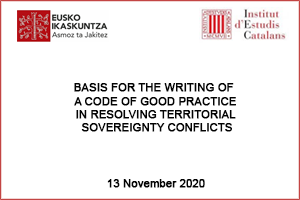Coordinators
AKIZU, Beatriz (Eusko Ikaskuntza)
LÓPEZ, Jaume (Universitat Pompeu Fabra)
Mario ZUBIAGA, Mario (UPV/EHU)
Code Writing Team
ALBERTÍ, Enoch (Universitat de Barcelona)
ÁLVAREZ, Amalur (UPV/EHU)
BARCELÓ, Mercè (Universitat Autònoma de Barcelona)
BENGOETXEA, Joxerramon (UPV/EHU)
ERRASTI, Ander (Institut d’Estudis de l’Autogovern)
IBARRA, Pedro (UPV/EHU)
LÓPEZ, Jaume (Universitat Pompeu Fabra)
NIKOLAS, Zelai (letrada del Parlamento Vasco)
PIÑOL, Elixabete (Jurista)
RUIZ VIEYTEZ, Eduardo (Universidad de Deusto-Deustoko Unibertsitatea)
SOBRINO, Joseba (Jurista)
ZUBIAGA, Mario (UPV/EHU)
Expert collaborators
ALÁEZ, Benito (Universidad de Oviedo-Universidá d’Uviéu)
ÁLVAREZ, Juan José (UPV/EHU)
AZKUNE, Jon (UPV/EHU)
BARANDIARAN, Xabier (Universidad de Deusto – Deustoko Unibertsitatea)
BASTIDA FREIXEDO, Xacobe (Universidad de Oviedo-Universidá d’Uviéu)
BOBER, Sergiusz (ECMI: European Centre for Minority Issues)
BOIX, Carles (University of Princeteon)
BOSSACOMA, Pau (Universitat Pompeu Fabra)
BULLAIN, Iñigo (UPV/EHU)
CAGIAO, Jorge (Université de Tours)
CARRIL VAZQUEZ, Xose Manuel (Universidade da Coruña)
CASAÑA-ADAMS, Elisenda (University of Edinburgh)
DELLA PORTA, Donatella (Scuola Normale Superiore)
DOMÈNECH, Xavier (Universitat Autonoma Barcelona)
DORDEVI´C-VIDOJKOVI´C, Ljubica (ECMI: European Centre for Minority Issues)
EZEIZABARRENA, Xabier (Universidad de Deusto-Deustoko Unibertsitatea)
FERRAIUOLO, Gennaro (Università degli Studi di Napoli Federico II)
GAGNON, Alain (Université du Québec à Momtréal)
GIBERNAU, Montserrat (University of Cambridge)
GRAU, Mireia (IEA)
ITCAINA, Xabier (UPPA)
KEATING, Michael (Centre on Constitutional Change- University of Aberdeen)
KRAUS, Peter (Universitát Augsburg University)
LASAGABASTER, Iñaki (UPV/EHU)
LETAMENDIA, Francisco (UPV/EHU)
LEVRAT, Nicolas (Université de Genève)
MANCINI, Susanna (University of Bologna)
McEWEN, Nicola (Centre on Constitutional Change -University of Edinburgh)
MARCELLI, Fabio (Instituto di Studi Giuridici Internazionale del CNR)
MARGIOTTA, Costanza (Università degli Studi di Padova)
PALERMO, Francesco (University of Verona)
PASTOR, Jaime (UNED)
PAYERO LÓPEZ, Lucía (Universidad de Oviedo-Universidá d’Uviéu)
PETTAI, Vello (Director ECMI: European Centre for minority Issues)
QVUORTRUP, Matt (Coventry University)
SAENZ DE ROZAS, Rafael (Jurista)
SANJAUME, Marc (UOC)
SAUCA CANO, José María (Universidad Carlos III)
SERRANO BALAGUER, Ivan (Internet Interdisciplinari Institut)
SKOUTARIS, Nikos (University of East Anglia)
URRUTIA, Iñigo (UPV/EHU)
VAN WALT VAN `RAAG, Michael (President of Kreddha)
VERGÉS, Joan (Universitat de Girona)
VILAJOSANA, Josep Maria (Universitat Pompeu Fabra)
VINTRÓ, Joan (Universitat de Barcelona)
WATERS, Timothy (Indiana University)








.jpg)